CCHD Feature Story on the Catholic Labor Network!
Check out the latest edition of the USCCB Catholic Campaign for Human Development’s newsletter Helping People Help Themselves… It’s all about the Catholic Labor Network!
Check out the latest edition of the USCCB Catholic Campaign for Human Development’s newsletter Helping People Help Themselves… It’s all about the Catholic Labor Network!
On Wednesday, August 8, people across the country saw the terrible scenes on their television: hundreds of ICE agents raiding several poultry plants in Mississippi, leaving crying children in their wake. The response from Church and labor was immediate. The state’s Catholic Bishops condemned the raid, and Catholic Charities set up headquarters in parishes near each plant. The United Food and Commercial Workers’ Union (UFCW) also rushed to the aid of the workers and their families Read more
On Tuesday, 58 airline food service workers and their supporters were arrested for blocking the entrance to the American Airlines headquarters at their Dallas-Fort Worth area hub, calling for a living wage. American Airlines has subcontracted food preparation there to LSG Sky Chefs, which pays entry-level workers less than $10 per hour – that’s an annual salary of less than $20,000 for a full-time worker, below the poverty level for a parent with two children. Meanwhile, American Airlines is running billion-dollar surpluses. Read more
As a hot August began, leaders from the National Farm Workers’ Ministry gathered in Washington to explore ways to extend solidarity to the men and women who harvest our food. The NFWM is an interdenominational Christian organization that supports farmworker unions and alt-labor formations with prayer and action. Their work supports the United Farm Workers, the Farm Labor Organizing Committee, and the Coalition of Immokalee Workers, to name a few.
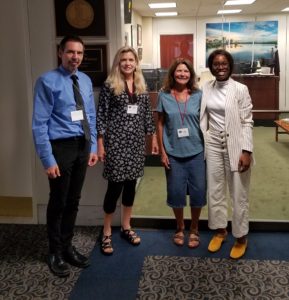
CLN Executive Director Clayton Sinyai joins NWFM activists to urge Sen. Mark Warner (VA) to support pro-farmworker legislation
Hill visits in 2019 focused on two critical pieces of legislation. The Fairness for Farmworkers Act seeks to redress a historic wrong: when New Deal reformers passed the Fair Labor Standards Act (FLSA) of 1938, which establishes overtime wages and other protections, farmworkers were excluded from coverage. Fairness for Farmworkers would extend overtime and other standard labor protections to these workers, and currently has 14 co-sponsors. The Agricultural Worker Protection Act, which the UFW has made a special priority, would offer undocumented farmworkers the opportunity to obtain a “blue card” giving them legal work status – and eventually to earn a green card. The bill has 13 co-sponsors.
The Catholic Labor Network is exploring opportunities to expand our work with NFWM and the nation’s farm worker organizations.
Writers often lament the loss of “good” American industrial jobs to trade and automation, and it’s true that the decline of US manufacturing has denied many Americans an opportunity to earn family-supporting wages and benefits. But those jobs didn’t start out “good jobs” – they became good jobs when workers organized, bargained and struck to make them good. Now airline catering workers are campaigning to do the same with a neglected segment of the air transportation industry, and the Catholic Labor Network is accompanying them in their struggle.
While the major US airlines earn billions of dollars in profits annually, the workers who pack the meals for flights endure low wages and unaffordable family health insurance. They have organized from coast to coast in unions, primarily UNITE HERE and the Teamsters, and are preparing to strike if necessary. For now they are engaged in a series of informational pickets to tell the public what’s going on.
On July 23, hundreds of airline catering workers from several East Coast states gathered at National Airport holding placards stating “ONE JOB SHOULD BE ENOUGH.” Tired of working for poverty wages and sometimes lacking health insurance for their spouses and children (two thirds of employees decline the insurance, which carries expensive employee premium payments), they warned air travelers that they had taken a strike vote and they were ready to ground planes to get justice.
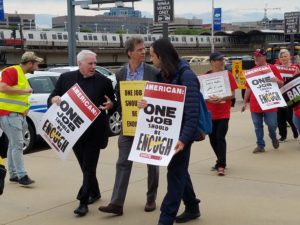
Catholic Labor Network board members Fr. Clete Kiley and Prof. Joe McCartin, with the Kalmanovitz Initiative’s Patrick Dixon, march in solidarity with airline catering workers.
The following week at the Roundtable of Catholic Diocesan Social Action Directors, the Catholic Labor Network invited Dallas-Fort Worth airport food service worker Letitia Gomez to tell social concerns staff about her job and why she was standing up. Gomez, a single mother who had worked for airline food service contractor Sky Chef for more than twenty years, still earned a salary below the federal poverty line. A parishioner at St. Luke’s in Irving, TX, Gomez appealed to listeners for solidarity.
The food service workers are preparing for a major action August 13 at the Dallas-Fort Worth Airport, where many will court arrest in civil disobedience actions. The metro area is the headquarters of American Airlines. The workers want AA to know that even if they outsource catering jobs, they can’t outsource their responsibility to the workers who occupy them.
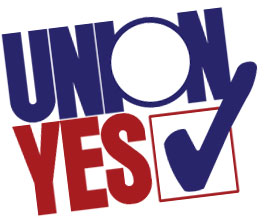 Pope Leo XIII, in his 1891 Encyclical Rerum Novarum, set out some basic principles of Catholic Social Teaching in a modern economy: that every worker has the right to a living wage, and that workers have the right to organize in labor unions. There’s some modest good news on both fronts in Washington. In mid-July the 2019 Raise the Wage Act passed the House of Representatives. Meanwhile, the Protecting the Right to Organize (PRO) Act continued to collect co-sponsors.
Pope Leo XIII, in his 1891 Encyclical Rerum Novarum, set out some basic principles of Catholic Social Teaching in a modern economy: that every worker has the right to a living wage, and that workers have the right to organize in labor unions. There’s some modest good news on both fronts in Washington. In mid-July the 2019 Raise the Wage Act passed the House of Representatives. Meanwhile, the Protecting the Right to Organize (PRO) Act continued to collect co-sponsors.
Pope Leo XIII, in his 1891 Encyclical Rerum Novarum, set out some basic principles of Catholic Social Teaching in a modern economy: that every worker has the right to a living wage, and that workers have the right to organize in labor unions. There’s some modest good news on both fronts in Washington. In mid-July the 2019 Raise the Wage Act passed the House of Representatives. Meanwhile, the Protecting the Right to Organize (PRO) Act continued to collect co-sponsors.
The Raise the Wage Act proposes to raise the federal minimum wage in a series of steps to $15/hour in 2025. The bill passed the House July 18 by a vote of 231-199. The federal minimum wage has not been raised for a decade.
The PRO Act targets a number of tactics employers often use to prevent their workers from forming a union. It would provide swift remedies for workers illegally fired for union activity; forbids employers from holding “captive audience” meetings with workers, where they attack unions but don’t permit union advocates to respond; and offers binding arbitration when an employer refuses to bargain with a union voted in by a majority of employees. The PRO Act has won 190 co-sponsors in the House, and 40 in the Senate.
Sadly, prospects for these important bills seem dim in the current Senate. The Catholic Labor Network hopes and prays that these initiatives for the common good will find a warmer welcome after the 2020 elections.
The Working Catholic: Extreme Capitalism
by Bill Droel
Economic indicators ebb and flow, though not with high predictability. In the years after World War II the U.S. economy was growing and its benefits were enjoyed by most middle-class families. Sputtering began in the late-1960s and by the mid-1970s U.S. companies were losing their competitive edge, details Steven Pearlstein in Can American Capitalism Survive? (St. Martin’s Press, 2018). U.S. consumers judged all types of imports to be of better quality and/or of a better price than the U.S.-made counterpart. Several U.S. companies, slow to innovate, were near extinction.
A rescue effort, indeed a transformation, began in the 1980s. President Ronald Reagan (1911-2004) is often associated with this economic comeback, but the factors were many. Re-engineering, mergers, deregulation, sub-contracting, new tech businesses and more all played a part. “The transformation was messy, painful, contentious and often unfair,” writes Pearlstein. However, “it worked.” He outlines the business philosophy that drove the recovery. Briefly: 1.) Government is “significantly responsible for the decline” in U.S. competitiveness; 2.) “The sole purpose of every business is to deliver the highest possible financial return to its investors; 3.) No matter how ruthless, no matter how big the wealth gap, business “must ignore and dismiss moral concerns as naïve and ultimately self-defeating.” Pearlstein nods favorably toward these principles—to a degree. He summarizes them as supply-side economics, maximum attention to shareholders and a self-justifying market.
Pearlstein goes on to argue that the improvements of the 1980s have gone extreme. “What began as a useful corrective” became “morally corrupting and self-defeating economic dogma.” The business philosophy of the moment is driven by supply-side fantasies, anti-regulatory zealots, single-mined management focused on short term stock returns, the “grubby pursuit of self-interest” and a perversion of justice that cheats, manipulates and disrespects loyal workers and ordinary consumers. Today’s business philosophy has “betrayed its ideals and its purpose and forfeited its moral legitimacy,” Pearlstein concludes.
Catholicism agrees. But it is not because the economy has taken some useful principles to an extreme. No, the principles named by Pearlstein are at fault, no matter the degree. Business is a noble vocation, Catholicism repeatedly proclaims. (See Vocation of the Business Leader, NCL, PO Box 291102, Chicago, IL 60629; free.) Further, there can be legitimate differences over how much government regulation is proper; over the relationship between shareholders and stakeholders; over the best way a business can serve the common good. But the prior principles for business are different in Catholicism than in extreme capitalism.
Work and creative genius are needed for any healthy economy, Pope Francis recently told an Italian business publication. A healthy economy “is never disconnected from the meaning of what is produced and economic activity,” he said. The meaning of work, Catholicism insists, is the worker. The first purpose of a business is its workers, which includes executives, janitors, sales force, delivery drivers, part-time consultants, assembly-line people and all others. Start with that principle, says Catholicism, and the chances increase for regular customers, honest suppliers, responsive lenders, successful recruiting and profit over time.
Unfortunately, Francis continued, some people have a business mentality which says money is made by money. But “money, real money, is done with work. It is work that confers dignity on people, not money.” Of course, financial investment is essential. And of course, profit is a good thing as long as “actions and responsibilities, justice and profit, production of wealth and its redistribution, operation and respect for the environment, become elements that over time guarantee the life of the company… From this point of view the meaning of the company widens and makes us understand that the sole pursuit of profit no longer guarantees the life of the company.” When Francis says “This economy kills,” he means extreme capitalism. It kills the very outcome that it pretends to desire.
Presenting Catholic economic principles is a hard sell. Who believes that our company or any company or firm is here for all the workers? It is a hard sell too because Catholic institutions are hypocritical when, for example, they preach justice but do not pay a family wage. Or hypocrisy is the word when bishops do not deal responsibly with deviant employees while preaching respect for life.
Yet some companies do operate under the principle that each worker is a subject of work. They do not—and should not—trumpet Catholicism on their marquee. A company does not have to be Catholic in any sense to be excellent. Nor is it is necessary that these good companies are even aware of any ethical sources for their operations. Finally, they don’t—and probably cannot—be consistently principled. There are though—partially, imperfectly, inconsistently—companies that are not interested in extreme capitalism.
Can you think of any? Chobani? Southwest Airlines? Starbucks? Procter & Gamble? UPS? Dick’s Sporting Goods? Please react to these suggestions and nominate others.
Businesses, says Pope Francis, “can make a great contribution so that work retains its dignity by recognizing that people are the most important resource of every company, working to build the common good, paying attention to the poor.”
Droel is associated with National Center for the Laity (PO Box 291102, Chicago, IL 60629)
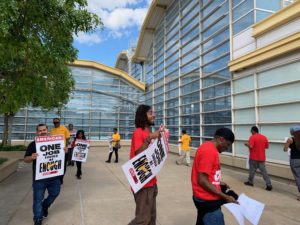
After a strike vote, food service workers at National Airport in Washington DC warn passengers about the developing labor dispute.
The workers who prepare food for flights are among the poorest paid in the airline industry. In many areas they earn little more than the minimum wage, and they can seldom afford the high premiums to participate in their employer’s health insurance plans. That’s why thousands of them have organized and joined UNITE HERE, the hotel and restaurant workers’ union. The catering firms that employ them, however, have refused to budge. So one by one, workers in airport kitchens across the country have taken strike votes. Will there be a nationwide strike in the fall?
That depends on the airlines. Although most of the airlines outsourced these jobs long ago, they still hold the key to a living wage for these food service workers. One job should be enough to support a worker and his or her family, and the highly profitable airlines can afford to make this happen. The Catholic Labor Network will keep you posted as this story develops.
In late June, hundreds of priests from across the country gathered in St. Louis for the annual meeting of the Association of US Catholic Priests (AUSCP) and elected Fr. Andy Switzer, a prominent West Virginia labor priest, to join the organization’s leadership team.
Fr. Switzer introduced himself to the assembly in a speech reflecting on his upbringing as the son of a coal miner and his ongoing commitment to bring the good news to West Virginia workers. Switzer first came to the attention of the Catholic Labor Network when he was arrested alongside more than two dozen retired mineworkers and union activists in a civil disobedience action. (The mine operators were attempting to use restructuring and bankruptcy proceedings to escape health care obligations for some 23,000 retirees.)
Other high points of the conference included a keynote address by Cardinal Blase Cupich exploring how both lay and ordained Catholics share a common priesthood through their Baptism, and a colloquium led by Bishop John Stowe on the topic of “Prophetic Obedience and Prophetic Action.” Finally, Fr. Rich Creason, recently retired Pastor of Holy Trinity Church in St. Louis and a longtime member of the Catholic Labor Network, was honored for his life’s work at an award banquet (alongside Sr. Norma Pimentel, whose work caring for migrants in McAllen, TX, has brought her national recognition).
The AUSCP’s Labor Working Group has supported Catholic Labor Network initiatives for several years, and today the organization is providing valuable assistance in our new Church-Labor Partnership Project.
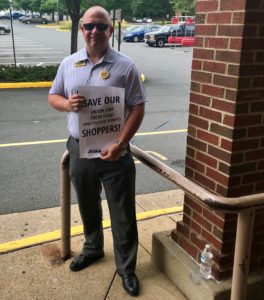 In the Baltimore-Washington area there are three union supermarket chains: Safeway, Giant, and Shoppers Food. There may soon be two, as Shoppers’ corporate parent is rapidly closing locations with little public explanation.
In the Baltimore-Washington area there are three union supermarket chains: Safeway, Giant, and Shoppers Food. There may soon be two, as Shoppers’ corporate parent is rapidly closing locations with little public explanation.
The grocery workers, who are members of United Food and Commercial Workers (UFCW) Locals 400 and 27, say the parent company, United Natural Foods Inc, (UNFI), is closing the profitable stores to satisfy private equity investors. They want the company to consider more than their wealthy investors, and have conducted informational picketing to alert the community.
Prior to its sale to UNFI, Shoppers had been known as a good company to work for, with excellent benefits and wages negotiated by UFCW over the years. The roughly 3000 Shoppers workers have an average seniority of 18 years and their long tenures in the same store means they know their customers personally. One UFCW member in DC expressed uncertainty about the future and the ability to find a secure job with good benefits in a grocery industry that is under pressure from anti-union retailers like Wal-Mart to drive down wages. She said many workers live paycheck to paycheck and losing these union jobs will drive many into financial distress trying to make ends meet. Union activists said Shoppers workers could go from a union job offering $18 per hour with vacation, extra Sunday pay, and excellent healthcare to a nonunion one offering $12 per hour with little or no benefits. Another member from a store in Maryland was worried about losing the healthcare benefits because her daughter depends on the vision benefits negotiated in her union contract.
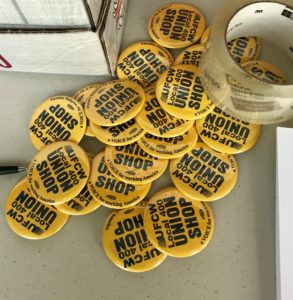 The UFCW members are frustrated because the parent company has left them in the dark about the store closures. UFCW is demanding the UNFI take measures to facilitate handing off the Shoppers locations to other union employers such as Giant or Safeway in order to preserve good jobs and avoid food deserts in poor communities.
The UFCW members are frustrated because the parent company has left them in the dark about the store closures. UFCW is demanding the UNFI take measures to facilitate handing off the Shoppers locations to other union employers such as Giant or Safeway in order to preserve good jobs and avoid food deserts in poor communities.
Losing union jobs like those at Shoppers has a devastating impact on workers and consumers in our communities. Many of the Shoppers locations facing closure are serving communities bereft of grocery stores and their closure drives consumers out of their community to shop. The decent wages and benefits offer stability and dignity in many communities that are often economically insecure.
As Catholics, we must stand up for good union jobs that uphold the dignity of work and give members of our community economic security. We need to stand against the erosion of decent jobs in favor of an economy that favors Wall Street and wealthy investors instead of our communities.
CATHOLIC LABOR NETWORK | 209 Maguire Hall • Georgetown University • 37th and O Streets NW • Washington, DC 20057
The Catholic Labor Network is a 501c3 organization incorporated in the District of Columbia.
